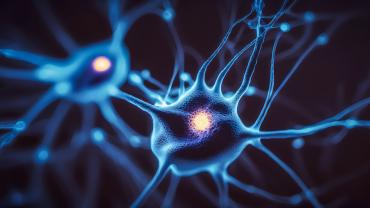
Neurons consume a relatively high amount of oxygen and have a high metabolic rate. Increases in oxidative stress and inflammation associated with certain aspects of the aging process can particularly influence neuronal health and brain changes.
Age-related neural changes can affect memory, cognitive function, and brain health. Certain neurodegenerative diseases are increasingly common among older adults. The underlying pathophysiology of some neurodegenerative diseases, such as Alzheimer’s disease (AD) is not yet fully understood. However, neuroinflammation, oxidative stress, and circadian rhythm dysfunction have been correlated with AD and certain other age-related neurodegenerative diseases. Some evidence suggests that certain lifestyle and dietary interventions may help support certain aspects of age-related changes and neural health.
A recently published review article by Knight and colleagues explored the potential relationship between age-related changes in neural health and nutraceuticals that may support antioxidative status. The authors analyzed data from clinical trials between the years 2012 and 2022 involving supplementation with several bioactive compounds and nutraceuticals including selenium, probiotics, and resveratrol.
Selenium is a trace mineral found in Brazil nuts, organ meats, certain fish, grains, and dairy products. According to research, selenium has been shown to promote certain aspects of cognitive function and helps to support antioxidative status.
A 2019 controlled trial (n = 90) explored the potential efficacy of 200 µg of selenium alone or with a probiotic daily for 12 weeks in individuals who were institutionalized with AD. The probiotic contained 2 billion colony-forming units of Lactobacillus acidophilus, Bifidobacterium bifidum (B. bifidum), and B. longum. Significant improvements related to antioxidative status (glutathione) and inflammation (high-sensitivity C-reactive protein) were observed in the selenium-only and combination treatment groups as compared to a placebo. The combination group was also observed to experience greater improvements in cognitive function as measured by the mini-mental state exam.
Resveratrol is a polyphenolic molecule found in grape skin, berries (such as blueberries and raspberries), and peanuts that may help support antioxidative stress. A randomized controlled trial (n = 117) investigated the efficacy of resveratrol supplementation on markers related to cognitive decline in individuals with mild-to-moderate AD. The study lasted 1 year, and it was reported that the resveratrol group experienced fewer changes associated with age-related cognitive decline as compared to the placebo group.
Overall conclusions from the review by Knight and colleagues indicate that specific clinical recommendations cannot be made based on current evidence. The data currently available are from smaller studies with short trial durations and relatively homogeneous populations. However, some preliminary evidence suggests that more research on this topic is warranted.
Although more research is needed, preliminary data suggest that some nutraceuticals, such as selenium and certain probiotics, may help support cognitive health. They may also help support age-related changes and antioxidative status.
By Dr. C Ambrose, ND, MAT